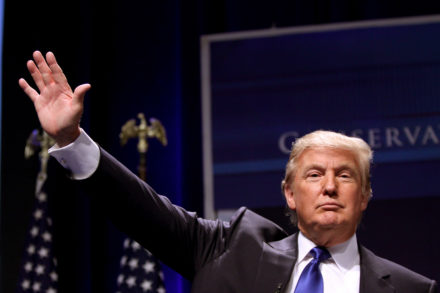
When he was running for President in 2016, Trump’s hostile campaign rhetoric towards Mexicans was picked up by the press internationally and his comments on Mexican immigrants – “They’re bringing drugs. They’re bringing crime. They’re rapists” – showed the world what kind of leader Trump was striving to be. Unfortunately, his aggression towards Latin Americans did not stop there.
Less known, and less reported, is what followed in 2017: hostile acts, threats and rhetoric towards different governments in Latin America, with Nicaragua and Venezuela receiving particularly harsh treatment. His interventions in the region were, as usual, dressed up in the language of human rights and democracy, but in reality they were designed to harm the countries’ economies.
The Nicaraguan investment conditionality act, known as the “NICA act”, aims to block international loans from the World Bank, International Development Bank and other institutions. Nicaragua currently receives around $250m each year in loans, which are invested in education, social programmes, electrification, roads and other infrastructure initiatives. But the NICA act could jeopardise these projects, damage poverty reduction programmes and the Nicaraguan economy, resulting in hardship – especially for the most vulnerable citizens.
In Venezuela, increasingly harsh economic sanctions have been imposed on the government under the cover of the ridiculous assertion that Venezuela poses a threat to US national security. The most recent and potentially damaging sanctions prohibit financial institutions from providing US dollars to the Venezuelan government or state oil company PDVSA. They also restrict PDVSA’s US subsidiary, Citgo, from sending dividends back to Venezuela and they restrict trade in government bonds.
Once again, concerns for democracy and human rights are offered as justification for harsh measures that can only result in more hardship for the Venezuelan people. The new sanctions will exacerbate shortages of food, medicine and other essential goods, while limiting the government’s ability to solve the country’s economic problems.
But as well as imposing tough economic sanctions, the US government has over the last six months been hardening its approach to effecting ‘regime change.’
In August, President Trump said military intervention in Venezuela was an option and went on to attack Venezuela in his speech at the United Nations. In November, Washington’s ambassador to the UN, Nikki Haley, declared: “the crisis in Venezuela today poses a direct threat to international peace and security. Venezuela is an increasingly violent narco-state that threatens the region, the hemisphere and the world.” And in February, US secretary of state Rex Tillerson weighed in, suggesting in a speech that Venezuelan President Maduro might be removed by a military coup.
Trump’s aggressive interventions towards Nicaragua and Venezuela are the latest in a long line of attempts by the US to destabilise Latin American governments. Other Latin American countries have suffered similar attacks on national sovereignty, ranging from covert funding of opposition groups and media misrepresentation through overt sanctions to military action.
One clear example is the US support for the 2009 coup in Honduras, which has since seen the country become the murder capital of the world for social and environmental activists. The US even recently intervened during the Honduran elections in December, recognising the pro-US candidate as President despite serious vote-fraud allegations by the opposition, journalists, and foreign observers, as well as calls for a re-run from the Organisation of American States (OAS).
It’s also vital to note that the Honduran security forces that have been employed to crack down on protests against the electoral scandal are, in part, US trained and US funded. It has also recently been revealed that they have received spyware from the British government.
Sanctions against Nicaragua and Venezuela, and interventions to prop up the extreme right wing regime in Honduras, are nothing to do with democracy or human rights. They are part of a broader policy of regime change aimed at any government in the region that rejects US domination of the region.
International solidarity is more important than ever. It’s time for us to stand up to Trump and say no to attacks on Latin America.
Colin Burgon is a former MP and honorary president of Labour Friends of Progressive Latin America.
You can follow Labour Friends on Facebook and Twitter.
This piece was commissioned by guest editor Diane Abbott.




More from LabourList
LGBT+ Labour suspends AGM amid fears of legal action over trans candidates running for women’s roles
‘Hyperlocal messaging can help Labour win elections: Here’s how’
Unite votes to re-examine relationship with Labour and suspend Angela Rayner